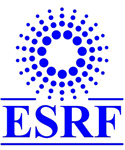The European Synchrotron, the ESRF, is an international research centre based in Grenoble, France.
Through its innovative engineering, pioneering scientific vision and a strong commitment from its 700 staff members, the ESRF is recognised as one of the top research facilities worldwide. Its particle accelerator produces intense X-ray beams that are used by thousands of scientists each year for experiments in diverse fields such as biology, medicine, environmental sciences, cultural heritage, materials science, and physics.
Supported by 22 countries, the ESRF is an equal opportunity employer and encourages diversity.
Crystallization is a process that is central to many industrial processes (e.g. construction, desalination, functional materials). Small amounts of (organic) molecules are widely used to control the outcome of these processes. But, increasing environmental awareness and new regulations are pushing the industry to use sustainable additives. To develop efficient "green" crystallization modifiers a fundamental understanding of their modus operandi at the nanoscale is required.
This PhD project aims to correlate the physicochemical properties of additives with their functionality during crystallization, and to pinpoint how these molecules are incorporated into the emerging crystalline framework. To achieve this you will use in-situ time-resolved Pair Distribution Function analyses combined with potentiometric titration measurements, Small-Angle X-ray Scattering studies, as well as complementary confocal microscopy experiments to monitor the crystallization process in the presence of different types of (green) additives.
You will join ID15A team at the ESRF and the Geochemistry team at ISTerre (CNRS & Univ. Grenoble Alpes); you will also perform experiments at BASF laboratories in Germany. ID15A is the world's most advanced high-energy X-ray scatterings instrument that enables in situ experiments of crystallization from diluted solutions. This project will push the boundaries of our understanding of additive controlled crystallization at the nanoscale.
Further information may be obtained from Marco Di Michiel (tel.: +33 (0) 476882123, email: [Email Address Removed]), from Alexander E.S Van Driessche (+33 (0) 476635194, email: [Email Address Removed]), and from Alejandro Fernandez Martinez (+33 (0) 476635197, email [Email Address Removed])
- Degree allowing enrolment for a PhD (such as MSc, Master 2 de Recherche, Laurea or equivalent) in (geo)chemistry, environmental science, physics, materials science, or any other closely related science.
- A background in experimentation is desirable. Knowledge of solution thermodynamics and X-ray scattering would be an advantage.
- Motivation to do coding (using e.g. Python) for data analysis is highly desirable in this work environment.
- Proficiency in English (A proof of upper-intermediate level would be advantageous and can be provided in the application. Applicants originating from native-English-speaking countries can apply without the need for proof of level. An official degree conducted in English will be also accepted as a proof; Students without proof upper-intermediate level may still apply and their level of English will be checked during the interview).
- Compliance with the Marie Sklodowska-Curie mobility rule: candidates may not have resided or carried out their main activity (work, studies, etc.) in France for more than twelve months in the three years immediately before the date of recruitment.
- At the date of recruitment, early-stage researchers must be in the first four years of their research careers and have not yet been awarded a doctoral degree.
- Candidates must satisfy eligibility criteria according to the partner university requirements for PhD enrolment.
More details about the application procedure on www.innovaxn.eu/for-students/documents/
The successful candidate will be enrolled in the doctoral school of University Grenoble-Alpes and based full-time at the ESRF (Grenoble, France), other than a 3.5 month secondment at BASF SE (Ludwigshafen, Germany). Additional visits totaling no more than 3 months may be made to the ISTerre (CNRS & University of Grenoble) when needed. Furthermore, a varied pedagogical training programme will be offered to the successful candidate throughout the 3-year PhD project.
More details on the InnovaXN programme on www.innovaxn.eu

 Continue with Facebook
Continue with Facebook

